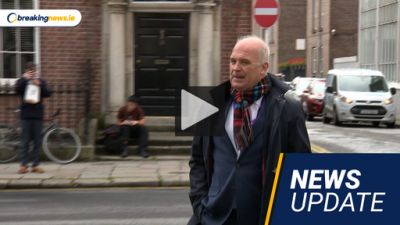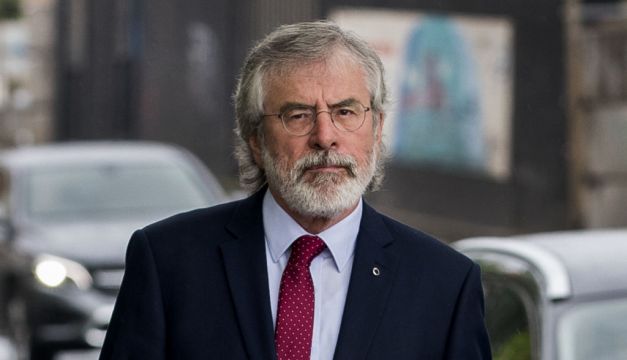Former Sinn Féin leader Gerry Adams wants certain aspects of the BBC's defence against his defamation action against the UK broadcaster over its reporting of the murder of Denis Donaldson struck out, the High Court has heard.
In a separate pre-trial motion, the BBC seeks discovery from Mr Adam's of materials and documents he may have regarding his alleged relationship with the IRA and comments he allegedly made in a 1987 press conference that the consequence of informing is death.
Mr Adams is suing the BBC claiming it defamed him when, he claims, it falsely alleged that he sanctioned the killing of former Sinn Féin official Denis Donaldson, who worked for decades as a spy for the British, in 2006.
His action is being brought before the High Court over a 2016 BBC Spotlight programme in which the allegation was made. There was also a follow-up article on the BBC website in which the same defamatory allegation was made, he claims.
Mr Adams has at all times denied any suggestion that he had anything to do with Mr Donaldson's death. The BBC denies defamation.
Qualified privilege
Two pre-trial motions in the action came before Ms Justice Emily Egan at the High Court on Tuesday.
In his motion Mr Adams, represented by Tom Hogan SC instructed by Johnson's solicitors, seeks an order from the court striking certain parts of the BBC's defence to the claims.
He wants the BBC's defences under Section 18, which concerns the defence of qualified privilege, and Section 26, namely that the article was a fair and reasonable publication concerning a matter of public interest, of the Defamation Act 2009 to be struck out.
Counsel said the defences pleaded in relation to the article are bound to fail on grounds including that the article, with a defamatory headline stating Mr Admas had sanctioned Donaldson's killing, had not been amended or adjusted when new information came to light.
This new information, counsel said, included reports that a man outside the jurisdiction with alleged links to dissident republicans was wanted by the gardaí on charges in connection with the murder. Dissident Republicans had claimed responsibility for Donaldson's murder in 2009, counsel added.
In addition, the BBC could not make a claim of qualified privilege in relation to the article, which counsel said was "quite different" to the Spotlight broadcast.
His client was not seeking to dismiss any parts of the defence in connection with the broadcast but should not have to fight the defences tendered on behalf of the article, counsel added.
Jury
In reply, Eoin McCullough SC, representing the BBC, rejected Mr Adam's arguments and said the broadcaster's defence of both the claim concerning the broadcast and the article should be allowed go before a jury hearing the defamation claim.
In its pre-trial motion, the BBC is seeking discovery of certain documents and materials from Mr Adams which it claims are relevant to its defence of his claims.
These include any documents, recordings or materials Mr Adams has in his possession regarding his relationship and association with the IRA.
The BBC also seeks discovery of any evidence, knowledge or recordings he has regarding his alleged knowledge of the treatment of those who informed on the IRA.
It further seeks materials concerning a press conference given by Mr Adams in 1987 where he said that "everyone in west Belfast knows that the consequence of informing is death".
The hearing of the BBC's motion, which is opposed, is expected to commence before the court on Wednesday.
In his action, Mr Adams says he suffered damage to his reputation as a result of what he says is the false allegation made by an anonymous source in the programme that he sanctioned the killing of Mr Donaldson (55) who worked for Sinn Féin in Stormont but who also was a spy for MI5 for two decades.
Mr Donaldson was shot dead at his cottage near Glenties, Co Donegal, in April 2006.

The anonymous source, referred to as 'Martin' in the programme, said he (Martin) was also a paid agent for British state security services, including MI5, while a member of the IRA.
The BBC denies it was defamatory and claims the programme/publication was put out in good faith and during discussion on a subject of public and vital interest.
The broadcaster argues it constituted responsible journalism, which was the result of careful investigation.
The hearing of the pre-trial motions continues.







